The Parables of Jesus

What are Parables?
Parables are short stories that serve to illustrate profound moral messages and truths.
Through evocative imagery, Jesus was able to convey impactful lessons and wisdom concerning the commitment of discipleship, the essence of Heaven, and the extent of God’s grace and severity, alongside other pertinent instructions.
Why did Jesus Teach in Parables?
At the time, only religious leaders and the scholarly were privileged to read and sermonize on God’s Word. Largely, the religious teachings took the form of lectures and grossly authorized misunderstanding and error. Jesus’s parables changed that dynamic.
Jesus employed parables as an easy-to-understand and relatable method to convey His teachings to those who would listen and accept His doctrine. (Accept is a keyword.) This opened the gate for people from all walks of life to have access to His teachings.
His parables were unlike previous instructions. Not only were they rendered in a simpler format, but they were able to captivate and engage the audience. Those who listened and sought to understand enlisted their imagination.
His parables provide applicable examples for His disciples on how to live their lives in accordance with His covenants. Those engrossed by His words were able to connect their personal experiences with His teachings.
His parables are communicated in a way that allows His message to be conveniently circulated throughout different cultures, languages, and generations.
Keyword: Accept
The following scriptures provide a deeper comprehension as to why Jesus taught with parables.
The disciples came to him and asked, “Why do you speak to the people in parables?” He replied, “Because the knowledge of the secrets of the kingdom of heaven has been given to you, but not to them. Whoever has will be given more, and they will have an abundance. Whoever does not have, even what they have will be taken from them. This is why I speak to them in parables:
“Though seeing, they do not see; though hearing, they do not hear or understand. In them is fulfilled the prophecy of Isaiah:
“‘You will be ever hearing but never understanding; you will be ever seeing but never perceiving. For this people’s heart has become calloused; they hardly hear with their ears, and they have closed their eyes. Otherwise, they might see with their eyes, hear with their ears, understand with their hearts and turn, and I would heal them.’” But blessed are your eyes because they see, and your ears because they hear. For truly I tell you, many prophets and righteous people longed to see what you see but did not see it, and to hear what you hear but did not hear it.
Matthew 13:10-17
+
When he was alone, the Twelve and the others around him asked him about the parables. He told them, “The secret of the kingdom of God has been given to you. But to those on the outside everything is said in parables so that,
“‘they may be ever seeing but never perceiving, and ever hearing but never understanding; otherwise they might turn and be forgiven!’”
Mark 4:10-12
+
His disciples asked him what this parable meant. He said, “The knowledge of the secrets of the kingdom of God has been given to you, but to others, I speak in parables, so that,
“‘though seeing, they may not see; though hearing, they may not understand.’”
Luke 8:9-10
+
The proverbs of Solomon son of David, king of Israel:
for gaining wisdom and instruction; for understanding words of insight; for receiving instruction in prudent behavior, doing what is right and just and fair; for giving prudence to those who are simple, knowledge and discretion to the young- let the wise listen and add to their learning, and let the discerning get guidance-for understanding proverbs and parables, the sayings and riddles of the wise. The fear of the Lord is the beginning of knowledge, but fools despise wisdom and instruction.
Proverbs 1:1-7
+
Jesus often taught to crowds of people. He didn’t discriminate against anyone- people from all walks of life were welcome to hear His messages. However, only His true followers were privy to accurately discern the meanings of His parables. Those who rejected Him remained perplexed and incapable of solving the riddle.
Tips and Tricks for Decoding Parables
- Identify the purpose- strive to discern the purpose behind the parable. Why does Jesus want us to know this information?
- Establish a complete understanding of the context- the context surrounding the parable grants a full picture and account of Jesus’s teachings.
- Keep in mind the cultural differences between then and now- some customs, syntax, and metaphors in the parables may not be considered common knowledge by today’s standards.
- Define the central basis- the majority of the parables have one central point. All of the details originate from this point.
- Be sure to avoid adding emphasis on small details- sometimes small details are just that, small details. They don’t always supplement the meaning or purpose.
- Acquire a basic knowledge of common figures and forms used throughout the Bible- there are various depictions used within the Bible to describe words or themes. An example of this is the word ‘sheep’ which refers to God’s followers.
- Take considerable note of the ending- this is where the crucial revelations are unveiled.
The Parables
***Below, we’ve categorized the parables. Because of this, you may notice some of the parables are listed more than once. Several of the parables don’t fit into just a single category. ***
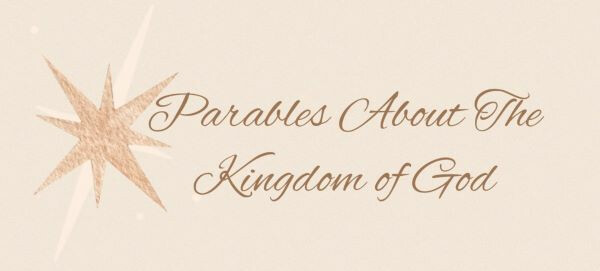 Parables About the Kingdom of God
Parables About the Kingdom of God
---------------------------------------------------
The Parable of the Growing Seed
Passage: Mark 4:26–29
Setting: Jesus is teaching a large crowd by a lake.
Message: Good and evil are always growing. Be wary of your choices and actions. Faith can only grow with the help of God.
---------------------------------------------------
The Parable of the Great Banquet
Passage: Luke 14:15–24
Setting: Jesus is dining at the Pharisee’s house. He is sitting at a table with other dinner guests.
Message: The Kingdom of Heaven is a gift. Make Him a priority and do what must be done in order to join Him.
READ MORE! Read about the banquet parables here.
---------------------------------------------------
The Parable of the Wedding Banquet
Passage: Matthew 22:1–14
Setting: Jesus is speaking with a large crowd congregating outside of the temple. The priests are questioning Jesus’s authority.
Message: Everyone is invited to join God in His Kingdom, but only the obedient will be included.
READ MORE! Read about the banquet parables here.
---------------------------------------------------
The Parable of the Leaven
Passage: Matthew 13:33, Luke 13:20–21
Setting: Jesus is teaching a large crowd by a lake.
Message: God’s Word will change the hearts of those willing to accept it. This change will bring on the transformation of God’s Kingdom.
---------------------------------------------------
The Parable of the Net
Passage: Matthew 13:47–50
Setting: Jesus is teaching a large crowd by a lake.
Message: True followers of the Lord will be separated from the wicked. The wicked will not be permitted entrance into God’s Eternal Kingdom.
---------------------------------------------------
The Parables of the Hidden Treasure and the Pearl
Passage: Matthew 13:44–46
Setting: Jesus is teaching a large crowd by a lake.
Message: The Kingdom of God is of significant value. It is worth giving up mortal possessions and desires for.
---------------------------------------------------
The Parable of the Mustard Seed
Passage: Matthew 13:31–32, Mark 4:30–32, Luke 13:18–19
Setting: Jesus is teaching a large crowd by a lake.
Message: The Kingdom of God is magnificent.
---------------------------------------------------
The Parable of the Weeds and the Wheat
Passage: Matthew 13:24–30, Matthew 13:36–43
Setting: Jesus is teaching a large crowd by a lake.
Message: Evil grows among good. Be careful and steadfast, and stay close to the Lord.
Learn more! Read “Messages Embedded Within The Parable of The Weeds and The Wheat.”
---------------------------------------------------
The Parable of the Sower
Passage: Matthew 13:3–23, Mark 4:3–20, Luke 8:5–15
Setting: Jesus is teaching a large crowd by a lake.
Message: Everybody receives God’s teachings, but the teachings will fall upon those who are unwilling to understand.
Read More! Read The Parable about Parables Here!
---------------------------------------------------
The Parable of the Homeowner
Passage: Matthew 13:52
Setting: Jesus is teaching a large crowd by a lake.
Message: True disciples of Christ are trained leaders and examples who are able to accurately interpret the Word of God.
---------------------------------------------------
The Parable of the Sheep and the Goats
Passage: Matthew 25:31–46
Setting: Jesus is warning His disciples about the end of days.
Message: Be generous and take on any opportunity to serve others.
---------------------------------------------------
 Parables About Love and Forgiveness
Parables About Love and Forgiveness
---------------------------------------------------
The Parable of the Good Samaritan
Passage: Luke 10:30–37
Setting: An expert in the law asked Jesus how he could inherit eternal life. Jesus responded but the man further inquired and asked Jesus who counts as a “neighbor” that he is supposed to love.
Message: We are commanded to love everyone, despite transgressions and feelings others may be harboring.
Learn More! Read More about The Good Samaritan
---------------------------------------------------
The Parable of the Unmerciful Servant
Passage: Matthew 18:21–35
Setting: Peter asked Jesus how many times he should forgive someone.
Message: We must always forgive those who have done wrong against us.
---------------------------------------------------
The Parable of the Moneylender
Passage: Luke 7:40–43
Setting: A sinner uses her hair, tears, and perfume to anoint Jesus’s feet. Jesus was questioned as to why He would allow a sinner such as her to touch Him.
Message: God shows mercy to those seeking redemption.
---------------------------------------------------
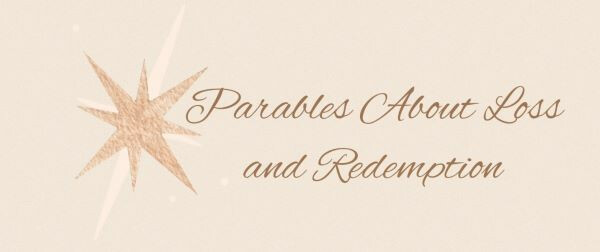 Parables About Loss and Redemption
Parables About Loss and Redemption
---------------------------------------------------
The Parable of the Prodigal Son
Passage: Luke 15:11–32
Setting: Jesus is teaching a crowd of tax collectors, Pharisees, and sinners. The crowd of people were muttering and spiteful.
Message: If we seek it, God is always willing to forgive and blanket us in His Grace.
---------------------------------------------------
The Parable of the Lost Coin
Passage: Luke 15:8–10
Setting: Jesus is teaching a crowd of tax collectors, Pharisees, and sinners. The crowd of people were muttering and spiteful.
Message: God rejoices over all who repent and come back among the fold.
---------------------------------------------------
The Parable of the Lost Sheep and the Parable of the Wandering Sheep
Passage: Matthew 18:12–14, Luke 15:1–7
Setting: Although the message in these parables is similar, the circumstances differ. In the Parable of the Wandering Sheep, Jesus is speaking with His disciples. They ask Jesus who is the greatest in Heaven. In the Parable of the Lost Sheep, Jesus is teaching a crowd of tax collectors, Pharisees, and sinners. The crowd of people were muttering and spiteful.
Message: God’s Grace and love do not discriminate.
---------------------------------------------------
The Parable of the Workers in the Vineyard
Passage: Matthew 20:1–16
Setting: Jesus is teaching to a crowd in Judea.
Message: God is right and just in blessing those who followed His Word for years or for a week as he sees fit.
---------------------------------------------------
 Parables About The End Times
Parables About The End Times
---------------------------------------------------
The Parable of the Returning Owner
Passage: Matthew 24:45-51, Mark 13:34–37, Luke 12:35-38, Luke 12:42–48
Setting: Jesus warns His disciples about the end of days.
Message: Always be watchful, for you do not know when Christ will return.
---------------------------------------------------
The Parable of the Thief in the Night
Passage: Matthew 24:42-44
Setting: Jesus warns His disciples about the end of days.
Message: Prepare yourself for Christ’s return. Continue to be watchful.
---------------------------------------------------
The Parable of the Ten Virgins
Passage: Matthew 25:1–13
Setting: Jesus warns His disciples about the end of days.
Message: Prepare yourself for Christ’s return.
---------------------------------------------------
The Parable of the Great Banquet
Passage: Luke 14:15–24
Setting: Jesus is dining at the Pharisee’s house. He is sitting at a table with other dinner guests.
Message: The Kingdom of Heaven is a gift. Make Him a priority and do what must be done in order to join Him.
READ MORE! Read about the banquet parables here.
---------------------------------------------------
The Parable of the Wedding Banquet
Passage: Matthew 22:1–14
Setting: Jesus is speaking with a large crowd congregating outside of the temple. The priests are questioning Jesus’s authority.
Message: Everyone is invited to join God in His Kingdom, but only the obedient will be included.
READ MORE! Read about the banquet parables here.
---------------------------------------------------
The Parable of the Rich Fool
Passage: Luke 12:16–21
Setting: Jesus is speaking with a large crowd.
Message: Material earthly greed is counterproductive to achieving eternal wealth.
---------------------------------------------------
The Parable of the Tenants
Passage: Matthew 21:33–46, Mark 12:1–12, Luke 20:9–19
Setting: Jesus is speaking with a large crowd congregating outside of the temple. The priests are questioning Jesus’s authority.
Message: God’s Kingdom is reserved for those who are pure in heart and true followers of Him.
---------------------------------------------------
The Parable of the Net
Passage: Matthew 13:47–50
Setting: Jesus is teaching a large crowd by a lake.
Message: True followers of the Lord will be separated from the wicked. The wicked will not be permitted entrance into God’s Eternal Kingdom.
---------------------------------------------------
The Parable of the Weeds and the Wheat
Passage: Matthew 13:24–30, Matthew 13:36–43
Setting: Jesus is teaching a large crowd by a lake.
Message: Evil grows among good. Be careful and steadfast, and stay close to the Lord.
Learn more! Read “Messages Embedded Within The Parable of The Weeds and The Wheat.”
---------------------------------------------------
The Parable of the Budding Fig Tree
Passage: Matthew 24:32–35, Mark 13:28–31, Luke 21:29–33
Setting: Jesus is warning His disciples about the end of days.
Message: Jesus reveals the signs of the end.
---------------------------------------------------
The Parable of the Unfruitful Fig Tree
Passage: Luke 13:6–9
Setting: A crowd has gathered and members of the crowd informed Jesus about the misfortune that fell upon some Galileans. The individuals in the crowd implied that the Galileans met their fate as a form of judgment.
Message: We need to act fast and repent of our sins.
---------------------------------------------------
The Parable of the Sheep and the Goats
Passage: Matthew 25:31–46
Setting: Jesus warns His disciples about the end of days.
Message: Be generous and take on any opportunity to serve others.
---------------------------------------------------
The Parable of the Two Sons
Passage: Matthew 21:28–32
Setting: Jesus is speaking with a large crowd congregating outside of the temple. The priests are questioning Jesus’s authority.
Message: It is imperative that our words are aligned with our actions. God is all-knowing.
---------------------------------------------------
The Parable of the Talents/Minas and The Parable of the Bags of Gold
Passage: Matthew 25:14–30, Luke 19:12–27
Setting: Jesus is warning His disciples about the end of days.
Message: Utilize and grow the gifts God has provided you. Minister to others with the resources that have been graciously bestowed upon you.
---------------------------------------------------
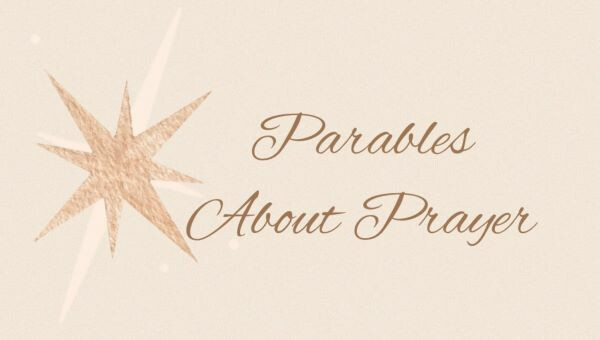 Parables About Prayer
Parables About Prayer
---------------------------------------------------
The Parable of the Friend at Night
Passage: Luke 11:5–10
Setting: Jesus’s disciples ask Him to teach them how to pray.
Message: God hears and answers our prayers.
---------------------------------------------------
The Parable of the Persistent Widow
Passage: Luke 18:2–8
Setting: Jesus teaches His disciples about the importance of consistency in prayer.
Message: Be consistent and unyielding in prayer.
---------------------------------------------------
The Parable of the Pharisee and the Tax Collector
Passage: Luke 18:9–14
Setting: Jesus warns those who are arrogant.
Message: Humble yourself in your heart, before others, and before the Lord.
---------------------------------------------------
 Parables About the New Covenant
Parables About the New Covenant
---------------------------------------------------
The Parables of New Cloth and New Wineskins
Passage: Matthew 9:16–17, Mark 2:21–22, Luke 5:36–38
Setting: Jesus is speaking to John the Baptist's disciples. They ask Jesus why the Pharisees fast but He and His disciples do not.
Message: There are notable differences between the New Covenant and the Old Covenant.
---------------------------------------------------
The Parable of the Homeowner
Passage: Matthew 13:52
Setting: Jesus is teaching a large crowd by a lake.
Message: True disciples of Christ are trained leaders and examples who are able to accurately interpret the Word of God.
---------------------------------------------------
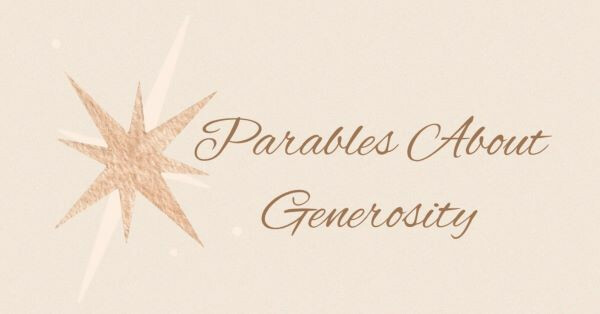 Parables About Generosity
Parables About Generosity
---------------------------------------------------
The Parable of the Rich Man and Lazarus
Passage: Luke 16:19–31
Setting: Jesus is speaking to his disciples. Nearby Pharisees overhear and mock Jesus.
Message: Mortal wealth and greed does not earn you a place in Heaven.
---------------------------------------------------
The Parable of the Shrewd Manager
Passage: Luke 16:1–9
Setting: Jesus is speaking to his disciples. Nearby Pharisees overhear and mock Jesus.
Message: Live your life in stewardship and generosity.
---------------------------------------------------
The Parable of the Sheep and the Goats
Passage: Matthew 25:31–46
Setting: Jesus is warning His disciples about the end of days.
Message: Be generous and take on any opportunity to serve others.
---------------------------------------------------
The Parable of the Luncheon for the Poor
Passage: Luke 14:12-14
Setting: Jesus is dining at the Pharisee’s house. He is sitting at a table with other dinner guests.
Message: Treat and serve those who are facing challenges and going without.
READ MORE! Read about the banquet parables here.
---------------------------------------------------
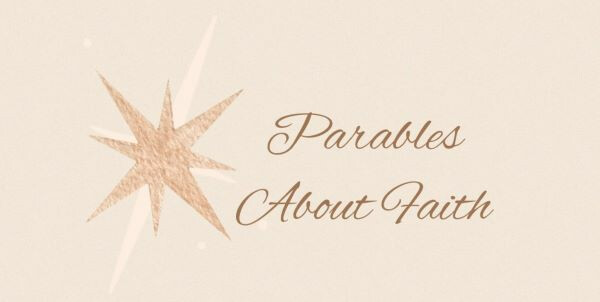 Parables About Faith
Parables About Faith
---------------------------------------------------
The Parable of the Lamp Stand/ The Parable of the Lamp of the Body
Passage: Matthew 5:14–16, Mark 4:21–25, Luke 8:16-18, Luke 11:33-36
Setting: Jesus is teaching a large crowd by a lake.
Message: Do not keep your light (faith) hidden. Share it. Those who possess a willingness to understand will be enlightened.
---------------------------------------------------
The Parable of Counting the Cost
Passage: Luke 14:28–33
Setting: Jesus is walking with a large crowd and speaking with them.
Message: Jesus emphasizes the requirement to be a true disciple.
---------------------------------------------------
The Parable of the Wise and Foolish Builders
Passage: Matthew 7:24–27, Luke 6:47–49
Setting: Jesus is speaking with a large crowd during the sermon on the mount.
Message: Build your foundation upon His words and teachings.
---------------------------------------------------
The Parable of the Talents/Minas and The Parable of the Bags of Gold
Passage: Matthew 25:14–30, Luke 19:12–27
Setting: Jesus is warning His disciples about the end of days.
Message: Utilize and grow the gifts God has provided you. Minister to others with the resources that have been graciously bestowed upon you.
---------------------------------------------------
The Parable of the Two Sons
Passage: Matthew 21:28–32
Setting: Jesus is speaking with a large crowd congregating outside of the temple. The priests are questioning Jesus’s authority.
Message: It is imperative that our words are aligned with our actions. God is all-knowing.
---------------------------------------------------
 Parables About Humility
Parables About Humility
---------------------------------------------------
The Parable of the Embarrassed Guest
Passage: Luke 14:7–11
Setting: Jesus is dining at the Pharisee’s house. He is sitting at a table with other dinner guests.
Message: Be humble. Always.
READ MORE! Read about the banquet parables here.
---------------------------------------------------
The Parable of the Master and the Servant
Passage: Luke 17:7–10
Setting: Jesus is speaking to his disciples. His apostles asked Him to increase their faith. His response was to share the parable.
Message: God provides us with everything. He owes us nothing. By obeying Him, we are simply doing what is required of us and shouldn’t expect anything in return.
---------------------------------------------------
In Closing
Jesus used parables to convey vital messages and details about His Gospel. By presenting His truth by route of parables, listeners were able to absorb His teachings by being actively engaged through their imagination and familiarity. However, the significance of His parables was lost to those whose hearts were not in the right place. This opened the door to separate the wheat from the weeds, so to speak.
Although they were told long ago, the eternal truths enclosed within each parable are relevant to our lives today. The parables are another source you can turn to and study to further evolve your knowledge and faith.
-Torrance Church of Christ
